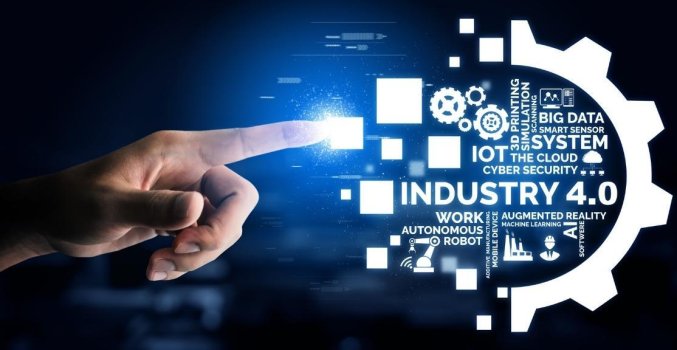K
Kathleen Martin
Guest
By Kaulana Akamu, Industrial Network Specialist, Fiberroad IIoT
Industry 4.0 is a complex journey, with many variables. Many of the new technologies are not readily available to all organizations. It will take time, dedication, and money to implement these technologies and make a company successful in Industry 4.0. The key is to embrace the concepts and strategies of Industry 4.0.
There are several opportunities to improve the process of manufacturing. This includes the creation of autonomous production, real-time information transparency, and decentralized decision-making. By implementing these technologies, businesses can achieve the dream of digital transformation. In addition, they will be able to increase productivity in the process. Some of these technologies are already being utilized in a variety of sectors.
Industrial IoT has many potential applications, ranging from manufacturing to consumer services. For example, predictive analytics can help companies reduce maintenance costs. By monitoring millions of vibrations made by machines in a day, companies can determine when a machine is due to break down. By using this data to anticipate problems before they arise, companies can avoid costly repairs and downtime.
Industry 4.0
Industry 4.0 is a process of digitalization, merging manufacturing and IT operations. This transition is being characterized as the fourth industrial revolution and represents a complete shift away from centralized to decentralized manufacturing. The transformation requires new business models, talent, and technology. Advanced robotics and intelligent machines are part of this next industrial revolution.
The Industrial Internet of Things is a key enabler for Industry 4.0. By leveraging the power of data and connectivity, businesses can create intelligent products and processes, improve employee productivity, and create more efficient supply chains.
Industry 4.0 is a trend that spans multiple industries. It incorporates data analytics, machine-learning algorithms, and automation to reduce human work. This helps increase production efficiency, while allowing human operators to focus on monitoring systems instead. It also improves profitability through predictive maintenance and reduced capital expenditures.
A major evolution of IoT and industry 4.0
The Industrial Internet of Things (IIoT) and Industry 4.0 are two emerging industrial technologies that share many common features. Both are focused on the creation of new business models and cyber-physical systems to make production more efficient. Both are evolving in tandem, so that companies can take advantage of their benefits while collaborating to meet business goals.
The fourth industrial revolution (also known as Industry 4.0) is an information-intensive transformation of manufacturing. It is the development of connected systems that combine big data, embedded software, and industrial assets. The technology is used to connect and monitor industrial assets, and it is also used to create more intelligent processes.
Continue reading: https://techbullion.com/how-will-industrial-iot-drive-industry-4-0/
Industry 4.0 is a complex journey, with many variables. Many of the new technologies are not readily available to all organizations. It will take time, dedication, and money to implement these technologies and make a company successful in Industry 4.0. The key is to embrace the concepts and strategies of Industry 4.0.
There are several opportunities to improve the process of manufacturing. This includes the creation of autonomous production, real-time information transparency, and decentralized decision-making. By implementing these technologies, businesses can achieve the dream of digital transformation. In addition, they will be able to increase productivity in the process. Some of these technologies are already being utilized in a variety of sectors.
Industrial IoT has many potential applications, ranging from manufacturing to consumer services. For example, predictive analytics can help companies reduce maintenance costs. By monitoring millions of vibrations made by machines in a day, companies can determine when a machine is due to break down. By using this data to anticipate problems before they arise, companies can avoid costly repairs and downtime.
Industry 4.0
Industry 4.0 is a process of digitalization, merging manufacturing and IT operations. This transition is being characterized as the fourth industrial revolution and represents a complete shift away from centralized to decentralized manufacturing. The transformation requires new business models, talent, and technology. Advanced robotics and intelligent machines are part of this next industrial revolution.
The Industrial Internet of Things is a key enabler for Industry 4.0. By leveraging the power of data and connectivity, businesses can create intelligent products and processes, improve employee productivity, and create more efficient supply chains.
Industry 4.0 is a trend that spans multiple industries. It incorporates data analytics, machine-learning algorithms, and automation to reduce human work. This helps increase production efficiency, while allowing human operators to focus on monitoring systems instead. It also improves profitability through predictive maintenance and reduced capital expenditures.
A major evolution of IoT and industry 4.0
The Industrial Internet of Things (IIoT) and Industry 4.0 are two emerging industrial technologies that share many common features. Both are focused on the creation of new business models and cyber-physical systems to make production more efficient. Both are evolving in tandem, so that companies can take advantage of their benefits while collaborating to meet business goals.
The fourth industrial revolution (also known as Industry 4.0) is an information-intensive transformation of manufacturing. It is the development of connected systems that combine big data, embedded software, and industrial assets. The technology is used to connect and monitor industrial assets, and it is also used to create more intelligent processes.
Continue reading: https://techbullion.com/how-will-industrial-iot-drive-industry-4-0/

